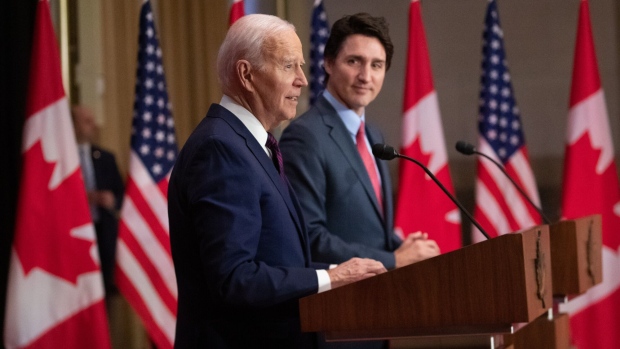Jun 11, 2024
The Daily Chase: U.S. business groups push back on Canada's proposed digital services tax
, BNN Bloomberg

Here are five things you need to know this morning:
Digital services tax may prompt CUSMA fight: Eleven prominent trade groups in the U.S. are pushing the Biden administration to take stronger action against Canada’s recently-proposed digital services tax. In an open letter to U.S. Trade Representative Katherine Tai, groups such as the Chamber of Commerce, the National Foreign Trade Council and others urged the agency to “leverage its enforcement tools to protect both U.S. business interests and the U.S. tax base.” It’s a major push back on last week’s move by Ottawa to finally move ahead with a proposed digital services tax, slapping a three per cent levy on the revenue of foreign tech giants that operate in Canada. The business groups aren’t the only ones who have taken issue with the tax proposal, as an influential U.S. Senate Committee has also railed against the idea. In the letter, the groups urge Washington to undertake formal dispute resolution processes under the CUSMA free trade deal to halt what they call “discriminatory taxes against U.S. entities.”
French election call prompts volatility in Europe: Trading in Europe has been volatile today as investors flee for safe haven assets on fears that far-right parties may grab more power following the sudden election call on Monday by French President Emmanuel Macron. French bond yields are spiking at their fastest two-day pace since the start of the pandemic. The yield on 10-year French debt jumped 10 basis points to 3.32 per cent, an extraordinary movement in the normally staid world of bonds. The gap between French bond yields and German bunds has widened to its biggest gap since October. Traders were focused on speculation that Macron may resign if his party performs poorly in upcoming elections, a vote that he himself called for after far-right parties scored major wins in European Parliament elections over the weekend. In equities, France’s benchmark index, the CAC40, lost more than one per cent for the second day in a row. Markets are set to close in the 11 o’clock hour eastern time and we’ll bring you live coverage as it happens.
Canada’s first waste-to-energy plant using carbon capture storage gets green light: A facility promising to use municipal garbage as fuel to produce electricity and store the waste underground is one step closer to reality today, after two companies struck a deal with the federal government’s Canada Growth Fund (CGF) to make it happen. TSX-listed Gibson Energy would own 50 per cent of an Edmonton-area plant, due to be commissioned in 2027, which will be able to process 200,000 metric tons of municipal solid waste annually, producing 165 gigawatts of electricity. Most of the emissions produced during the incineration process - 180,000 tons a year - will be piped to an underground reservoir. The $15 billion CGF will own 40 per cent, while Varme Energy, the Canadian subsidiary of Norwegian-based waste-to-energy firm Varme Energy AS will own the remainder.
Building permits blow past expectations: Canadian building permits rose 20.5 per cent in April compared with the month before; more than four times what economists were expecting. Statistics Canada reported Tuesday that the pace of new permits was the fastest since May of 2020. Excluding the pandemic, it’s the quickest gain since March of 2009. The strong showing provides a glimmer of hope that construction may be finally starting to quicken in an economy that badly needs residential construction.
Elon Musk threatens to ban Apple devices following OpenAI pact: A day after Apple unveiled its latest offerings in the AI space, Elon Musk says the company’s devices will be banned at his companies if it goes ahead with plans to integrate OpenAI technology into its operating system. “If Apple integrates OpenAI at the OS level, then Apple devices will be banned at my companies,” Musk wrote on X, the social network that he owns. “That is an unacceptable security violation.” It’s worth noting Musk had a hand in founding OpenAI but had a falling out with the company. He has recently launched his own AI firm, X.ai with its own rival chatbot to OpenAI’s CHatGPT. “Visitors will have to check their Apple devices at the door, where they will be stored in a Faraday cage,” he added, referring to a device that blocks electromagnetic fields.